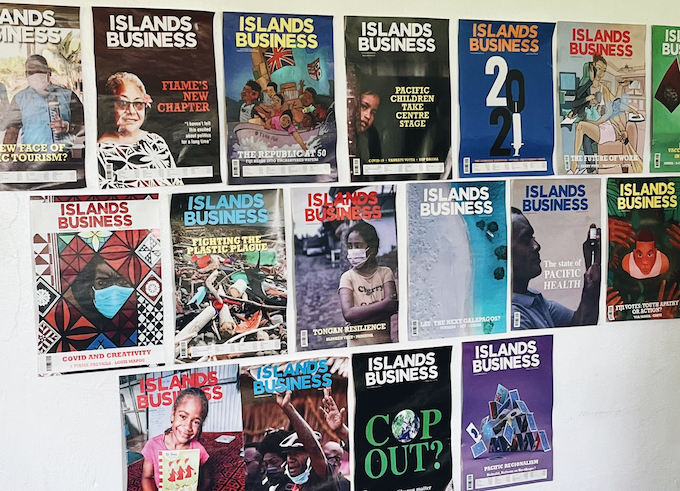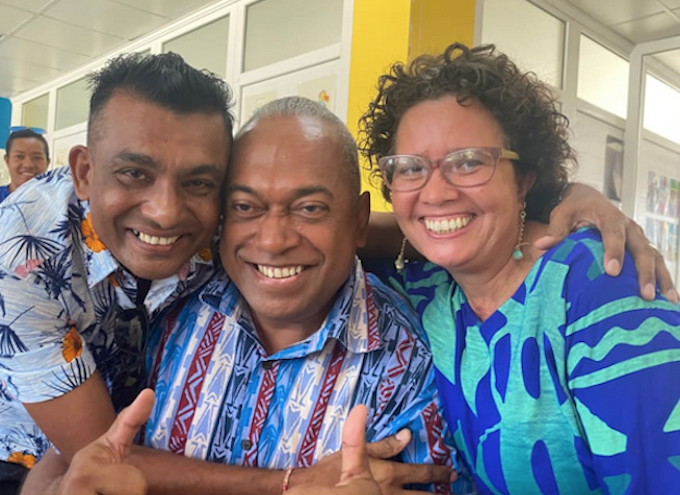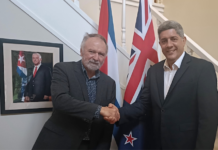
By Teagan Laszlo, Queensland University of Technology
For Samantha Magick, journalism isn’t just a job. It is a lifelong commitment to storytelling, advocacy, and empowering voices often overlooked in the Pacific.
As the managing editor and publisher at Islands Business, the Pacific Islands’ longest surviving news and business monthly magazine, Magick’s commitment to quality reporting and journalistic integrity has established her as a leading figure in the region’s news industry.
Magick’s passion for journalism began at a young age.
“I wanted to be a journalist when I was like 12,” Magick recalls. “When I left school, that’s all I wanted to study.”
She remembers her family’s disapproval when she would write stories as a child, as they thought she was “sharing secrets”. Despite that early condemnation, Magick’s thriving journalism career has taken her across continents and exposed her to diverse media landscapes.
After completing a Bachelor of Communications with a major in journalism at Charles Sturt University in Bathurst, Australia, Magick began her career at Communications Fiji Limited (CFL), a prominent Fijian commercial network.
She progressed over 11 years from a cadet to CFL’s news director.
Guidance of first boss
Magick attributes some of her early success to the guidance of her first boss and CFL’s founder, William Parkinson. She considers herself fortunate to have had a supportive mentor who led by example and dared to take risks early in life, such as founding a radio station in his 20s.
After leaving CFL, Magick’s career took her across the globe, including regional Pacific non-government organisations, news publications in Hawai’i and Indonesia, and even international legal organisations in Italy.
Magick, who is of both Fijian and Australian heritage, returned to Suva in 2018, where she began her current role as Islands Business’s managing editor.
“I’ve chosen to make my life in Fiji because I feel more myself here,” Magick says, reflecting on her deep connection to the island nation.
Magick’s vision for Islands Business focuses on delving into the deeper, underlying narratives often overshadowed by breaking news cycles and free, readily available news content.
“We need to be able to demonstrate the value of investigation, big picture reporting rather than the day-to-day stuff,” Magick says.
Magick prides herself on creating a diverse and inclusive newsroom that reflects the communities it serves.
Need for diverse newsroom
“You have to have a diverse newsroom,” she emphasises, recognising the importance of amplifying marginalised voices. “For example, there is a conscious effort to make sure our magazine is not full of photos of men shaking hands with other men.”
Magick also believes journalists have a responsibility to advocate for change, as demonstrated by Islands Business’s dedication to tackling pressing issues from climate change to media freedom.
“Why would I give a climate change denier space?” Magick questions when discussing the need to balance objectivity and advocacy. “Because it’s kind of going to sell magazines? Because it’s going to create a bit of a stir online? That’s not something we believe in.”
Despite her success, Magick’s career has not been without challenges. Magick worked through Fiji’s former draconian media restriction laws under the Media Industry Development Act 2010, while also navigating the shift to digital media.

Magick emphasises the need to constantly upskill and re-evaluate strategies to ensure she and Islands Business can effectively navigate the constantly evolving media landscape.
From learning to capitalise on social media analytics to locating reputable information sources when many of them feared to speak to the journalists due to the risk of legal retribution, Magick believes flexibility and perseverance are crucial to staying ahead in media.
In her early career, Magick also faced sexism and misogyny in the media industry. “When I think back about the way I was treated as a young journalist, I feel sick,” Magick says as she reflects on how she and her female colleagues would warn each other against interviewing certain sources alone.
Supporting aspiring journalists
The challenges Magick has faced undoubtably contribute to her dedication to supporting aspiring journalists, as evident through Kite Pareti’s journey. Starting as a freelance writer with no newswriting experience in March 2022, Pareti has since progressed to one of two full-time reporters at Islands Business.
Pareti expresses gratitude for the opportunities she’s had while working at Islands Business, and for the mentorship of Magick, whom she describes as “family”.
“Samantha took a chance on me when I had zero knowledge on news writing,” Pareti says. “So I’m grateful to God for her life and for allowing me to experience this once-in-a-lifetime opportunity.”
Magick reciprocates this sentiment. “Recently, I am inspired by some of our younger reporters in the field, and their ability to embrace and leverage technology — they’re teaching me.”
Magick anticipates an exciting period ahead for Islands Business, as she aims to attract a younger, professionally driven, and regionally focused audience to their platforms.
When asked about her aspirations for journalism in the region, Magick says she hopes to see a future where Pacific voices remain at the centre, “telling their own stories in all their diversities”.
Teagan Laszlo was a student journalist from the Queensland University of Technology who travelled to Fiji with the support of the Australian Government’s New Colombo Plan Mobility Programme. This article is published in a partnership of QUT with Asia Pacific Report, Asia Pacific Media Network (APMN) and The University of the South Pacific.











































